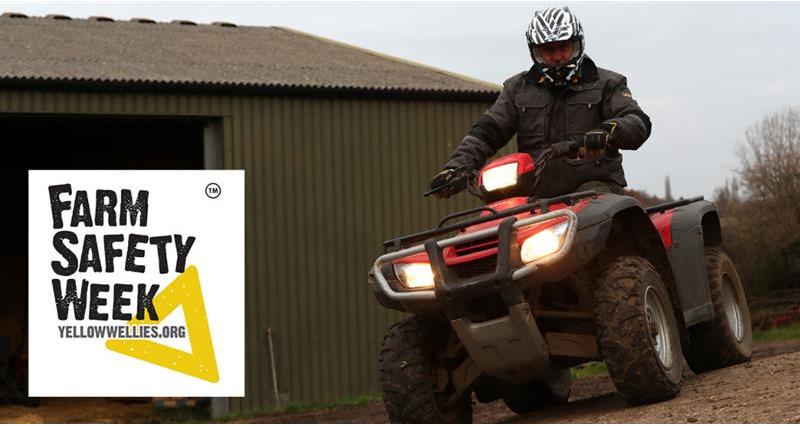Click the links below to jump straight to a topic:
- Vehicle health and safety
- Reducing the risk of workplace injury
- Machinery safety
- Risk assessments
- Exposure to the sun
- Stress and mental wellbeing
You can also find comprehensive information on staying safe on farm in the NFU's Farm Safety Hub.
Vehicle health and safety workshops
The NFU's regional offices organise workshops and campaigns to raise awareness of farm health and safety issues.
NFU East Anglia has been focusing on transport and how the operation and maintenance of vehicles can be better managed, especially in the lead up to harvest - one of the busiest times of year.
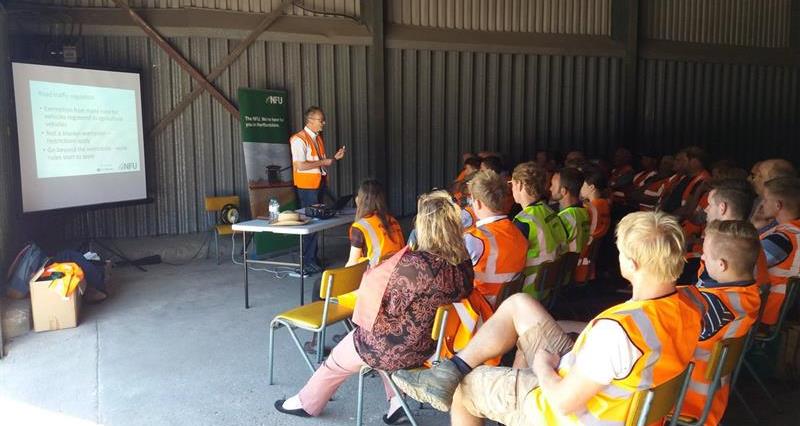
At the start of July 2019 the region organised a series of on-farm safety workshops hosted by NFU members. Five workshops were held within each county of the region, covering:
- Vehicle and driver regulation
- Trailer maintenance
- Best practice when working near overhead power lines
- Advice from the fire and rescue services on how to manage risks from field fires during harvest.
All the events were fully subscribed, with more than 600 farmers and farm workers attending.
NFU Cambridgeshire county network manager Adam Scott said: “Our members want to make their farms good places to work and their businesses to be as successful as possible. This is shown through the sheer amount of people signing up to these workshops.”
Get more advice on keeping vehicles safe - on road and off road
Reducing the risk of workplace injury
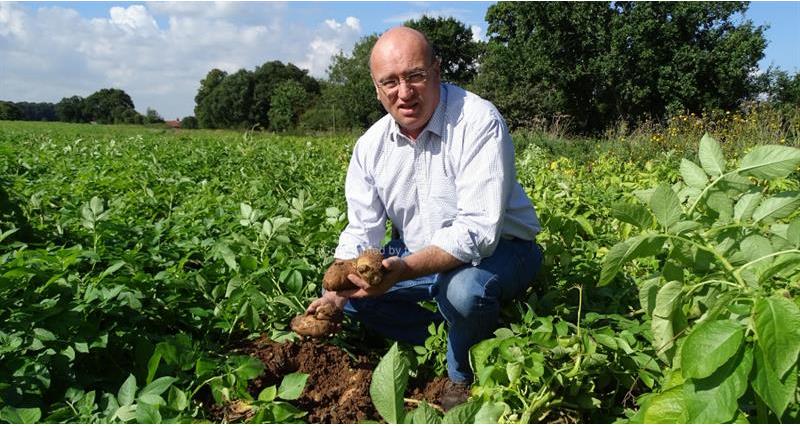
Tony Bambridge is an arable farmer in Marsham, Norfolk. His daughter, Sophie, is the farm’s business manager.
Tony said: "For me it is all about managing risk and so when I built a new seed store and grading line health and safety was top of my list. Safe access was built in to reduce the risks from working at height, and I made sure the lighting enabled high visibility. I also made sure it was specifically designed so that the work flows through the building in a certain way to help limit forklift truck movements.
Sophie said: "As a business we recognise that work needs to be done to improve farming’s safety records and mitigating risks is key to do this. One big challenge for me is to manage the risks that might occur at peak operating times. One way I’ve done this is to make sure that everyone takes time off and there is no working on Sundays.
"It’s important to remind people that their safety is much more important than getting a job done. At the end of the day, an injury is far worse than something taking a little longer to complete."
Get more advice on working at height
- Download the NFU safety guide on Slips, Trips and Falls
- Get more guidance at the HSE website
Machinery safety
In Cheshire, NFU county adviser Helen Wainwright, together with Cheshire YFC, has developed a campaign to make working with power take-off (PTO) machinery safer.
Checking equipment regularly is the key to make sure that PTO guards are in good condition. The campaign involves 11 Cheshire machinery dealers. Every time equipment is brought into one of the dealers to be serviced or repaired the condition of the PTO shaft is automatically checked. The dealer will then feed back to the farmer with details of any work needed and offer a 10% discount on any PTO parts that need to be replaced.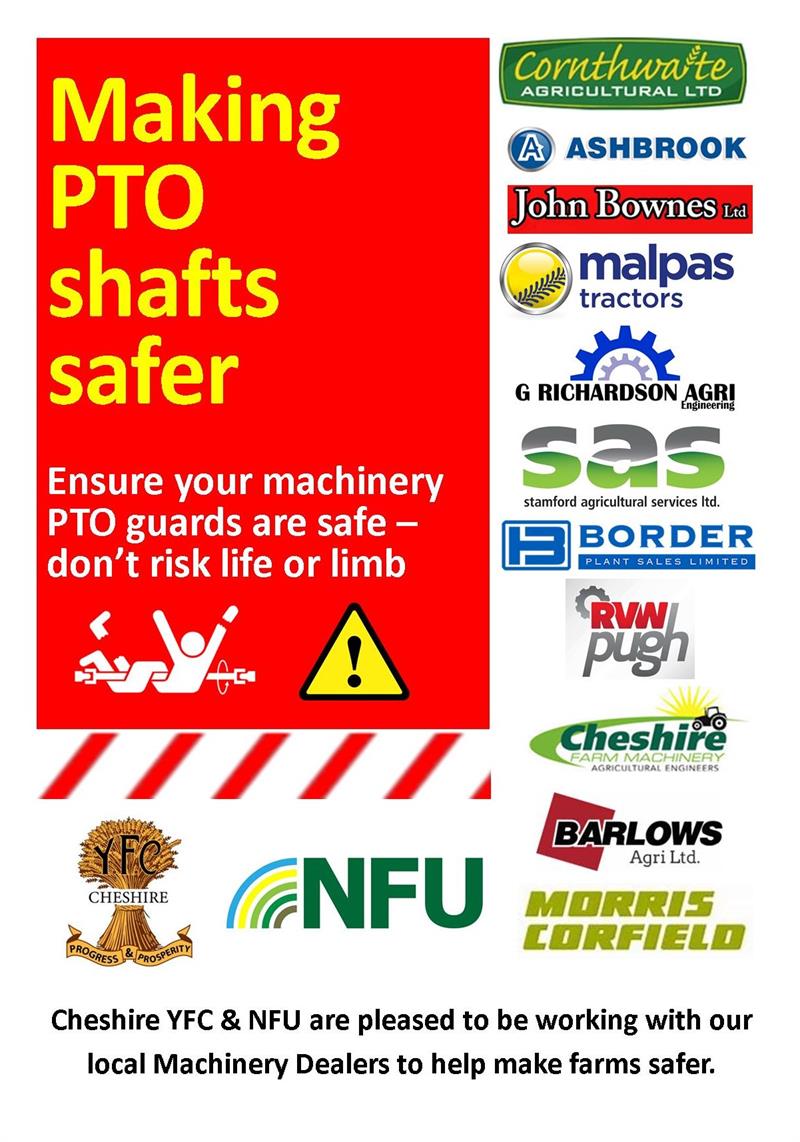
Helen is hoping that the discount and automatic checking service will help to encourage farmers to take a different approach and ensure their PTO is safe and in good condition.
She said: "We are trying to change the mindset of the younger generation. The biggest barrier to changing behaviour is complacency – people mean to do it but don’t get round to it.”
Richard Blackburn, NFU Cheshire county chairman, said: “NFU members need to be checking and replacing their PTO shafts on a regular basis. We need to get out of the mindset that accidents will never happen to us.”
Since the launch of this campaign on the 1 May this year, the uptake has been hugely positive with 190 PTOs being repaired or replaced by the beginning of June. The NFU aims to spread this campaign beyond Cheshire and into other regions in the future.
Get more advice on machinery safety
Risk assessments
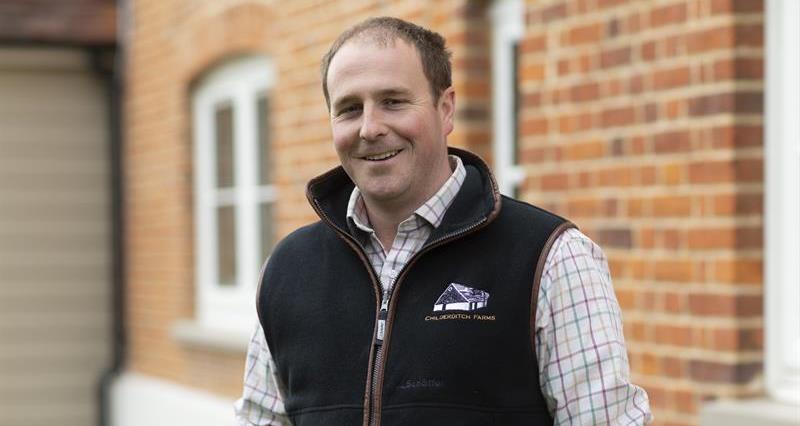
Ed Ford is an arable farmer in Essex and sits on the NFU’s next generation forum. He has carried out a comprehensive review of health and safety on his family farm.
He explained: "I first started looking into the health and safety standards of my family farm two years ago when I was a chairman of the Young Farmers Club. I thought if I’m going to preach about health and safety there are things I need to start doing myself.
"The farm already had a health and safety policy in place but it hadn’t been looked at for several years. I decided that the farm’s policy needed to be updated and I got an external company to carry out a comprehensive review of health and safety in the business.
"The results of this review came back with recommendations for improvements that I’ve now implemented. The main thing for me is that health and safety is not just a one off event. Things like risk assessments and safety reviews are live documents and need to change and adapt as the business does, so I’ve arranged for a follow-up safety review later this year. Cost is often seen as being a barrier to improving health and safety but I just think that money spent making improvements is money well spent, especially if it means preventing an injury.
"All farmers have a duty to manage health and safety properly, not just because the law demands it but because it is the right thing for our businesses and we have a duty to safeguard the people that work within them."
Get more advice on risk assessments
- Contact NFU CallFirst on 0370 845 8458
- Download NFU Business Guide 062
- Visit the HSE website
Exposure to the sun
Sometimes the health side of health and safety gets forgotten but the NFU team in the South East teamed up with the NHS to tackle one particular problem - the risk of ill health that can result from excessive exposure to the sun.
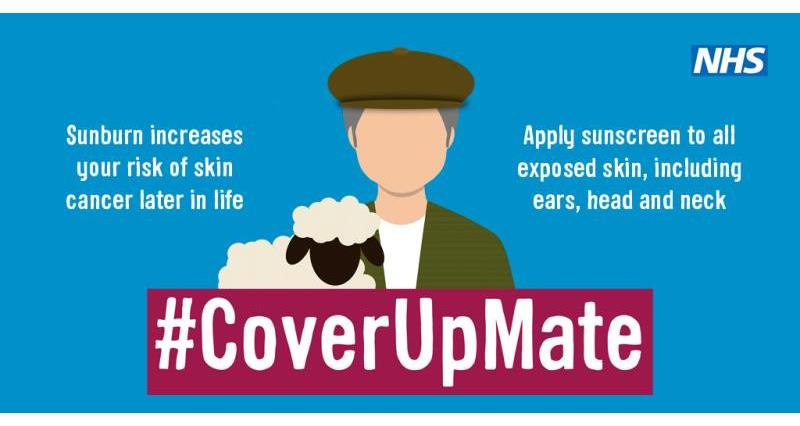
There is a growing awareness that exposure to the sun can cause harm and increase the risk of skin cancer, and across the south statistics are higher than the national average. The NHS and NFU South East’s Cover Up Mate campaign raises awareness of sun damage, particularly among those who spend long periods of time outside with prolonged exposure to the sun.
Last year, the NFU provided a UV monitor and sun screen dispenser at shows across the South East. Information cards were handed out when visiting exhibitors in the cattle and sheep lines, horticulture tents and farriery areas of showgrounds, as well as given to livestock marts to pass on to farmers. These information cards made people aware of the importance of getting moles checked early on.
Early treatment is vital, as NFU member Anthony Aston discovered when doctors removed a mole that turned out to be a malignant melanoma.
NFU Council delegate Julian Gibbons said: “It’s vital that farmers get sun-smart and take steps to protect their skin – such as using sun cream and wearing a cool shirt, or t-shirt and a hat. All these measures can help to prevent sunburn in the first place and avoid the UV damage that can lead to skin cancer over time.”
Stress and mental wellbeing
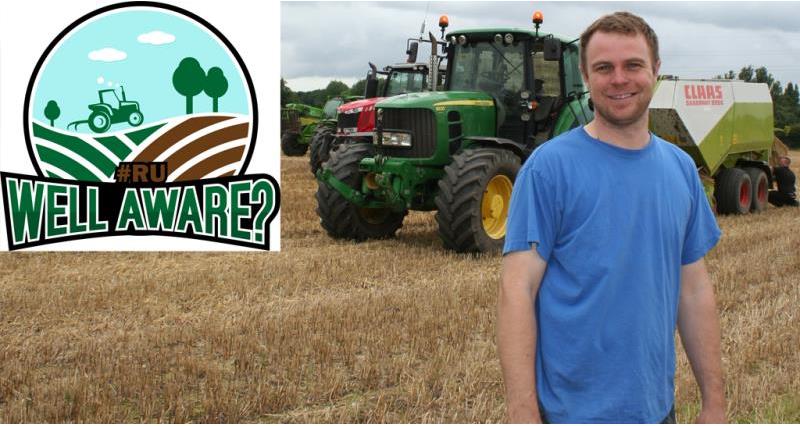
Olly Harrison is an arable farmer in Merseyside and acts as NFU Lancashire county chairman.
He said: "When I took over as county chairman I decided I actually wanted to make a difference. After suffering the loss of a close friend to suicide I realised that how we approach stress and mental wellbeing in agriculture has to change.
"I teamed up with former NFU adviser Aaron Naik who had trained as a counsellor and psychotherapist, and developed an awareness workshop called ‘RU Well Aware?’
"The workshops are designed to help remove the stigma of talking about mental wellbeing in agriculture. They have helped farmers gain a better understanding of mental health and the factors that can affect wellbeing, as well as being able to recognise signs of stress and knowing where they can get support.
"So far we have delivered the workshops in the North West and South West to over 100 farmers, vets, and agronomists.
"For me, getting people to talk is one of the best things you can do."
